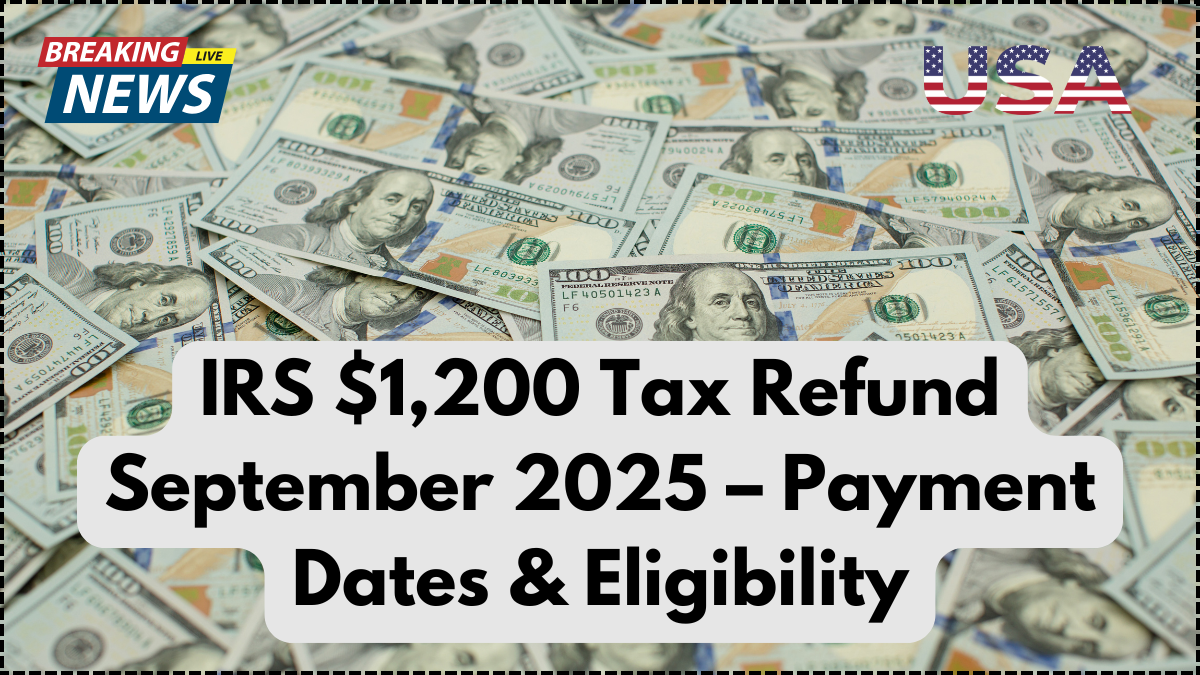The IRS $1,200 Tax Refund September 2025 Payment Update has captured widespread attention as millions of eligible Americans await the next wave of federal tax refunds. This payment initiative is part of an extended relief framework designed to support households facing ongoing financial pressures. Whether you’re a taxpayer waiting for your deposit or someone unsure of your eligibility, here’s a comprehensive breakdown of what to expect this September.

Who Qualifies for the IRS Refund 2025?
Eligibility for the IRS refund 2025 largely follows the same income thresholds and criteria set in previous stimulus-related payments. Individuals must have filed their 2024 tax returns by the IRS deadline and meet the following conditions:
- Adjusted Gross Income (AGI):
- Up to $75,000 for single filers
- Up to $150,000 for joint filers
- Up to $112,500 for heads of household
- Must not be claimed as a dependent
- Must possess a valid Social Security Number
- Must have a verifiable U.S. bank account for direct deposit
If you’re unsure about your eligibility, you can use the “Where’s My Refund?” tool on the official IRS website.
IRS Tax Refund Payout Schedule for September 2025
As of the latest IRS $1,200 Tax Refund September 2025 Payment Update, the payment schedule will follow a phased rollout. Here’s what the timeline currently looks like:
| Filing Date | Direct Deposit Begins | Paper Check Mail Dates |
|---|---|---|
| Filed before May 1 | September 5, 2025 | September 12, 2025 |
| Filed May 1 – June 15 | September 12, 2025 | September 19, 2025 |
| Filed after June 15 | September 19, 2025 | September 26, 2025 |
Refunds will be distributed via direct deposit where possible. Those without direct deposit information on file will receive a paper check, which may take longer to arrive.
How Will the Tax Refund Payout Be Delivered?
The IRS aims to prioritize electronic refunds. If your bank account is linked with your tax records, you can expect a direct deposit—typically quicker and more secure. For those relying on paper checks, delays are more common, especially in high-volume mailing periods.
Keep in mind that any pending tax debts or child support obligations may affect the final amount you receive. Refund offsets are automatically processed, reducing the payout accordingly.
Key Factors That Could Affect Your Payment
Several elements could influence the timing and amount of your IRS refund 2025:
- Filing errors or incomplete documentation
- Outstanding debts owed to federal or state agencies
- Incorrect bank details or address changes
- Identity verification holds triggered by IRS systems
To minimize disruptions, verify all your information when filing and stay alert for any IRS communication requesting follow-up.
What Makes This IRS Refund Different?
Unlike earlier stimulus payments, the IRS $1,200 Tax Refund September 2025 Payment Update is linked directly to your 2024 tax filing. It’s not a separate relief bill but rather a recalibrated credit processed as a refund. This integration ensures the payment is both accurate and timely, tied closely to your reported income.
While some may confuse this with recurring stimulus programs, this tax refund payout is a one-time event aimed at offering economic balance as inflation and living costs fluctuate.
Conclusion
With the IRS $1,200 Tax Refund September 2025 Payment Update now confirmed, millions of Americans are getting ready to receive much-needed financial relief. By understanding the eligibility requirements and payment schedule, you can better plan your finances and avoid unnecessary delays. Always ensure your tax documents are accurate and submitted on time to secure your portion of the refund without setbacks.
FAQs
When will I receive my IRS $1,200 tax refund in September 2025?
If you filed early, direct deposits will begin as soon as September 5, 2025, with paper checks arriving roughly a week later.
What if I haven’t filed my 2024 tax return yet?
You must file your 2024 tax return before the IRS can process your refund. Late filings may delay your payment beyond the September window.
Can I track my payment status?
Yes, use the “Where’s My Refund?” tool on the official IRS website for real-time updates.
Will everyone get $1,200?
Not necessarily. The exact refund amount depends on your income, filing status, and other eligibility criteria. Some recipients may receive a reduced amount.
Is this refund taxable?
No, the IRS $1,200 refund is not considered taxable income and does not need to be reported as earnings on your next return.
Click here to know more.